This post may contain affiliate links, which means I’ll receive a commission if you purchase through my links, at no extra cost to you. Please read full disclosure for more information.
Phone interviews are a critical part of the hiring process. Usually, it’s the first contact you will have with a company after submitting an application for a job. They are simple in theory, require a different kind of execution, and are often underestimated by candidates.
WHY YOU NEED TO BE MORE CONSCIOUS ON A PHONE INTERVIEW
Phone interviews aren’t taken as seriously as in-person interviews.
“It’s only a phone call” candidates think to themselves.
Yes, it’s ONLY a phone call. And that’s the problem. On a phone call, you can only make a positive impression with the words you say and the way you say them (aka your sound). Compare this to an in-person interview.
When you are interviewing face-to-face, you can make a positive impression with your looks and professional attire. You can use facial expressions and your body language to help communicate and exhibit confidence and comfortability.
You can’t do those things on a phone interview. You should be more conscious on a phone interview because of how limited the communication is.
To help you nail the phone interview, this post contains 25 tips to land you a job. You’ll see that the tips are divided into two sections: before and during. There are a group of tips of things you should do before your call starts and a group of tips for when the call is going on.
25 PHONE INTERVIEW TIPS TO LAND YOU A JOB
Before
1. Do some research
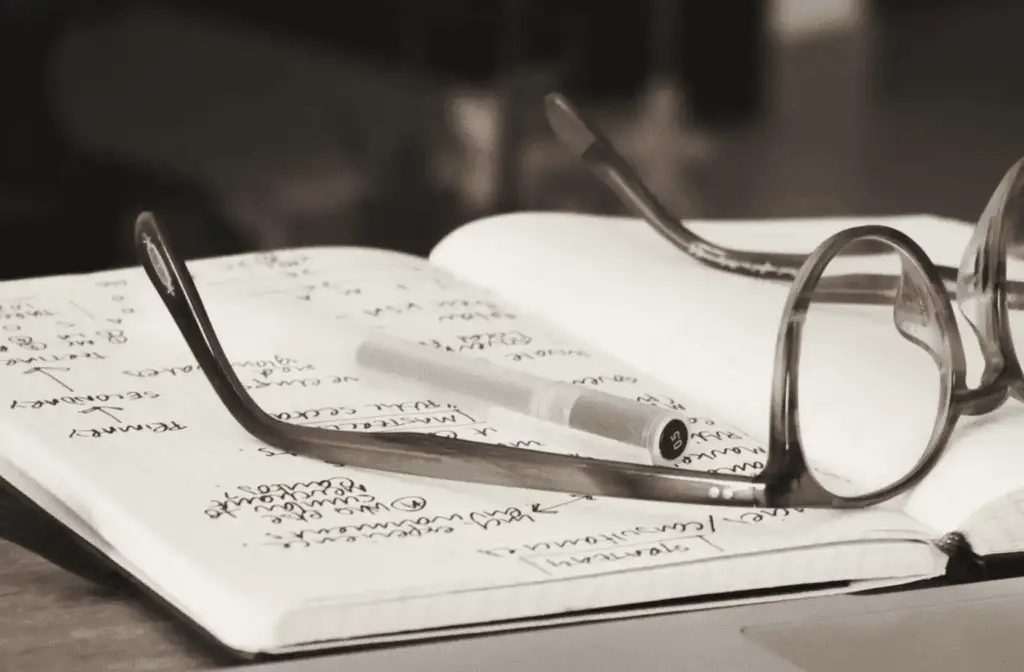
To start your preparation for the phone interview, begin by conducting research to gather together all information you can. Research the following:
- Position
- Company
- Interviewers
- Industries
- Interview format
- Commonly asked questions
Don’t leave any stone unturned during the research phase. The goal is to be conversational in each area so you can effectively answer questions.
2. Create list of questions to ask
A critical part of the phone interview is when the interviewers ask if you have any questions. This is your chance to learn more about the interviewer, position, and company. It is also a chance to make a strong impression.
Believe it or not, many interviewers put a lot of weight in the questions interviewees ask them. Create a list of thoughtful questions to ask.
3. Practice the common questions
Create Quizlet flashcards to study your list of interview questions. For myself, I would typically create 100+ flashcards covering 100+ questions. I would study that pile of cards and would have a separate, smaller pile of cards for common questions.
These are the 10-15 questions that are commonly asked across all interviews. If certain questions are likelier to be asked, it makes sense to dedicate more time to studying those. You want to be sure you can nail these questions.
For example, answering the “How do the 3 financial statements tie together?” won’t look as good if you can’t answer the “Can you tell me about yourself?” question.
4. Create your “60 Second Sell” and “5 Point Agenda”
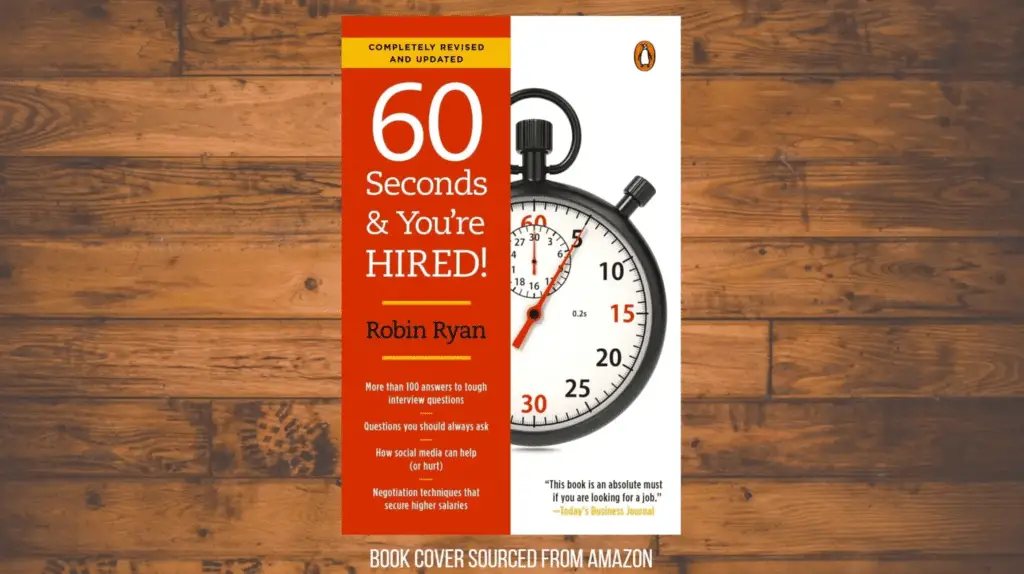
The 60 Second Sell and 5 Point Agenda are tools mentioned in the book *60 Seconds and You’re Hired!* by Robin Ryan. They are frameworks to highlight your strengths, experience, and knowledge during an interview.
The 60 Second Sell is essentially your 60 second pitch on why you are the best candidate for the job. In this post, I’ll mention how responses to questions should be concise and under 60 seconds. That is also recommended in the book.
The 5 Point Agenda is your top 5 points that you want the interviewer to understand about you. They can also be your selling points. You’ll create your 60 Second Sell and 5 Point Agenda and memorize them before the call. For more information, check out our book review on 60 Seconds and You’re Hired!
5. Prepare cheat sheets
The best part about phone interviews is the fact that the interviewer can only hear you. They cannot see you. Since they can’t see you, you can have anything in front of you to help out.
Create cheat sheets ahead of the call, much like you would create a cheat sheet for an exam. On this sheet, include things you think are important but have trouble remembering. These can be questions and answers, facts about the company, technical concepts related to the position, etc.
Take advantage of the phone interview structure. You can bet every other candidate is as well.
As a tip, if you are going to have cheat sheets, refrain from flipping through them during the call. The sound of the paper will be heard on the other end of the call and the interviewers will know you are using help.
6. Confirm the call details
This sounds obvious, but it needs to be said. Just recently, I prepared intensely for a phone interview scheduled at 7:00. I swear the call was supposed to happen on a Thursday morning. When Thursday came and it was 7:10, I was wondering where my call was. I looked at the email again and saw that the interview was on Friday.
Always double check the details of the call. Look at the dates, times, and any dial-in information that is given.
7. Work out beforehand
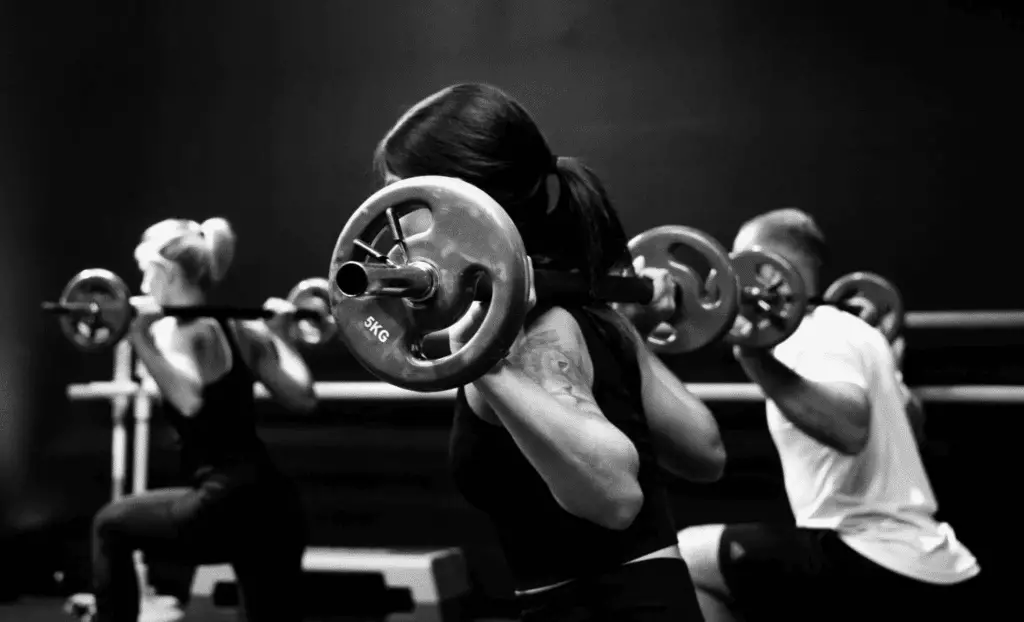
Exercise has tremendously positive effects on the brain and its performance. The book *Spark* was written exactly on this (check out book review).
It’s non-negotiable that I get exercise in before my call because of how important it is to me.
Here are the reasons I exercise before phone interviews:
- Exercise wakes you up so you will sound enthusiastic through the phone
- A workout will get blood and oxygen moving through your body and brain
- Stress caused by preparation has a chance to be relieved
- Your body will be filled with positive endorphins and hormones making you feel great
Time it out so the end of your workout is one hour before your call. This will give you enough time to catch your breath and run through a final practice.
The reason I end my workout so close to the call is so I can still reap the benefits of the exercise while I am going through the phone interview. Most benefits for focus and brain performance wear off after 60 to 90 minutes (Spark).
8. Have the call in a well-lit area
A key to the phone interview is being conscious of how you are sounding to the interviewer. Since you are robbed of communicating through your appearance and body language, you have to focus on your sound.
To help with sounding lively and enthusiastic, have the interview in a well-lit area, preferably lit with natural sunlight. This may make a small difference, but every edge counts. Having the call in a dark room can lead to you talking quietly, monotone, and with no energy.
9. Prep the environment
Take this part seriously. You want to set a perfect environment that allows you to focus in on the interview.
Here are things to do to prep your environment:
- Choose a quiet location
- Clear out any clutter
- Test the cell service so your connection has no issues
- Charge your cell phone so battery life won’t be a problem
- Eliminate any potential distractions
10. Set up materials nearby

At your location, set up your materials on the table or at a spot nearby. These are the resources you can keep close to use for help in the interview.
These include:
- Resume
- Job posting
- Cheat sheets
- Notepad
Lay them out across the table so you don’t have to flip through pages to find what you need.
11. Take deep breaths and strike power poses right before the call
In the minutes before the call, you’ll begin to feel nerves coming on. This is normal. Be aware of when they come on and take deep breaths to settle yourself down and get your body out of the fight-or-flight response that is happening.
Also strike “power poses.” If you haven’t heard of power poses, check out the YouTube video below where Amy Cudy describes how certain poses can change the chemistry in your body.
By simply standing in a confident and powerful position, you will produce chemicals that a confident and powerful person would produce. Take advantage of this and do a few poses before your call.
During
12. Stand up while doing to call
I haven’t seen this tip recommended, but this works for me and I wanted to share it with you.
Try standing up for the phone interview. When you stand up for the interview, your body is straight and upright and your voice is able to project better. This will help you in sounding strong and confident.
Personally, when I stand during the call, I feel less nerves. I pace slowly as the interview goes on and this movement puts me at ease and helps me think better. Try it out and see if this works for you.
13. Start off strong
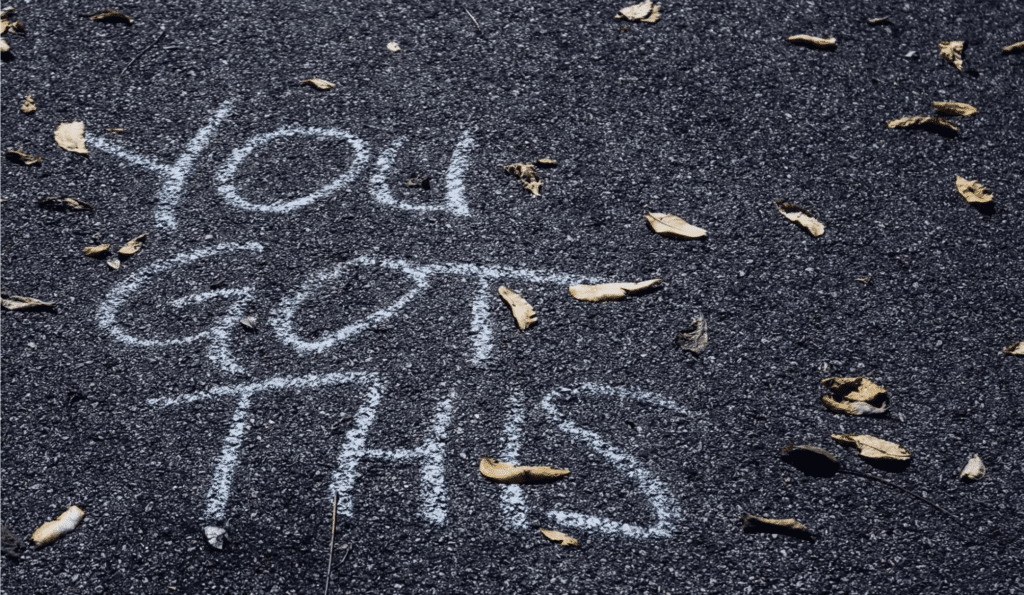
First impressions aren’t just important in person. They are important on the phone call. When you answer the phone, don’t simply say “Hello?” Answer with a professional greeting, such as:
- “Brandon speaking”
- “This is Brandon”
- “Hi! This is Brandon”
Answer cheerfully, but don’t overdo it. Start the call of with an appropriate amount of energy and always stay professional.
14. Take it as serious (if not more) as an in-person interview
Phone interviews are usually the first or second interview in the process before the in-person interviews happen. As a result, they are often taken lightly. You should take the phone interview serious because it is one of a few obstacles you need to overcome to land a job.
Looks, attire, and confident body language can all work to your advantage in an in-person interview. During a phone interview, the interviewer only has the audio coming through the speaker to judge you off of.
You need to realize that and take it seriously. Put yourself in the shoes of the interviewer and be aware of what you may sound like on the other side of the call.
15. Actively listen and monitor how much you are talking
Listen closely during the interview. It’s easy to be thinking about what you are going to say next while the interviewer is speaking. Instead, be sure to hear out your interviewer so you can best answer his or her question.
Also, be mindful about how much you are talking. You should not be overly dominating the conversation. Each answer to a question should be concise and under a minute. Negative side effects of speaking too much include:
- Losing your interviewer’s attention
- Limiting the time for your interviewer to ask more questions
- Showing poor communication skills
16. Stay focused (don’t wander)

Stay focused while you are speaking and while you are listening. Don’t veer off topic. Be sure to fully answer what you are asked to answer.
While you are listening, focus on your interviewer and what they are saying. Don’t doze off looking out the window and completely miss something important.
17. Speak at an appropriate pace, volume, and tone
Pace, volume, and tone are all important in sending messages to your interviewer in ways other than your words.
1. Pace – Speaking too fast can show that you are nervous. Speaking too slow can bore the interviewer and lose their interest. Speak at a normal pace and change up the pace every now and then too. Speaking at a comfortable pace communicates confidence to the interviewer.
2. Volume – Another sign of nervousness is speaking too quietly. Speak with volume so you can be heard clearly on the other side of the phone.
3. Tone – Changing up the tone of your voice can help you in emphasizing points in your responses. Avoid speaking in a monotone voice and change your tone and pitch appropriately.
18. Keep things conversational
In a phone interview (as well as all interviews) you want to keep things conversational. Don’t spit back robotic answers to questions that you have memorized from a blog post you saw. You should speak as if you were having a conversation.
Determining your competence is a key reason to have an interview, but the other major part is to learn about you, your behavior, and if you would fit in with the team that is hiring.
Professionals looking to hire someone largely care about finding out if they could see themselves working with you for extended hours. One way to do this is to keep things conversational.
19. Speak with enthusiasm and smile

Your enthusiasm needs to show through the phone via your voice. Focus on showing an appropriate level of emotion during the interview. You want to sound interested, excited, determined, and professional. This will all send positive messages to the interviewer.
Don’t hide your smile while you speak just because there is no one to see it. When someone smiles and talks at the same time, the sound is altered differently and the person hearing that can sense it.
Your interviewer will be able to tell when you are smiling and speaking, so smile all you want.
20. Be conscious of your humor
While smiles can be sensed, you should still be conscious of the humor you use on the call. When people make jokes or use sarcasm, the giveaway is usually through facial expressions and body language.
If you make jokes on a phone interview, it may fly over the interviewer’s head. I’m not saying you should avoid all jokes, but you should be conscious of it. If someone won’t get your sarcasm without additional context and cues, don’t use it. You wouldn’t want to offend anyone or cause a period of awkwardness.
21. Respond to questions with the job description in mind
As you respond to questions, keep the job description in your mind. Look at it on the table as the call is going on.
When you give an answer to a question, try to incorporate points from the description in your responses. If the job description requires someone with financial modeling skills, you can tell a story about a financial model you built during a summer internship.
The job description was written with a purpose; to find candidates that most fit the description. If you know what the description is asking for, you can supply answers that satisfy all the requirements. This boosts the odds of being hired.
22. Don’t be afraid to pause and collect your thoughts
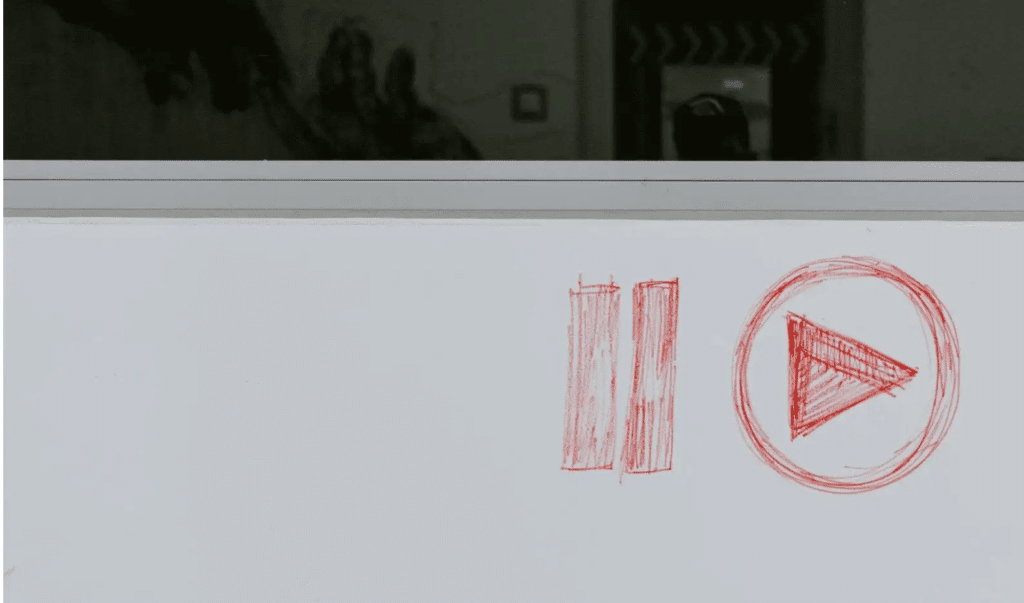
If you need a second to collect your thoughts before responding to a question, go ahead a pause for a second. The silence from pausing can seem like an eternity on the phone, but realize the pause you are taking is probably a lot shorter than you think.
Additionally, interviewers are used to having candidates pause. Yes, it’s impressive to be able to rattle off a response immediately after being asked, but if a thoughtful and well-put response is the result of a pause, the interviewer will still be impressed.
23. Stay concise to keep their attention
Unlike this lengthy blog post, keep things concise during your phone interview. Responses should take 60 seconds or less. Being concise takes skill, but if you can do it correctly, it’ll show you have superior communication skills.
Long responses during an interview can lose your interviewer’s attention. Also, the longer you talk, the higher the chances are that you veer off topic. When you go off topic, the interviewer might not even remember what your main point was.
24. End strong
The beginning and ending are the most memorable parts of anything. As your phone interview wraps up, focus on ending strong.
A strong ending involves:
- Reaffirming your interest in the job
- Closing by reminding them of your selling points as a candidate
- Maintaining enthusiasm and energy
- Thanking the interviewer for the opportunity
The goal is to have the interviewer hang up the phone and mark you down as their top candidate for the job.
25. Ask what the next steps are

During the conclusion of the interview, ask what the next steps are after the call. This will help you find out what the remainder of the process looks like and it will reaffirm your interest in the position.
When you ask what the steps are, you are telling the interviewer “I enjoyed this interview and look forward to going through the next steps.”
Check these posts out next to help with interviewing:
- Top 5 Ways to Succeed During an Interview in 2020
- Top 9 Essential Things To Do Before Your Job Interview
- The Financial Analyst Resume: Detailed 2020 Guide
- 18 Tips on How to Optimize Your LinkedIn Profile
SUMMARY
Phone interviews tend to be introductory interviews, but that isn’t always the case. I have had phone interviews that were much more difficult than I had anticipated.
Now I take every phone interview seriously. It is still one of the main hurdles any candidate has to clear on the path to getting hired.
In this post, we shared 25 tips to help you succeed in your phone interview. Implement them and take phone interviews seriously and your odds of success will shoot up.



